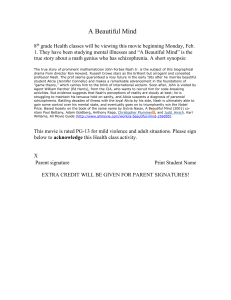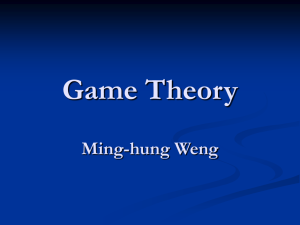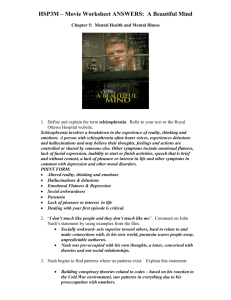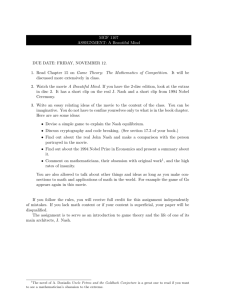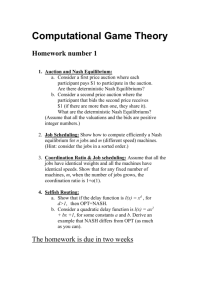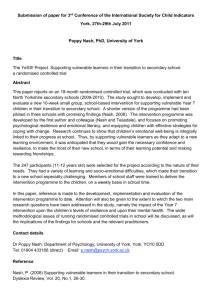File - Ms. Light Communication Arts
advertisement
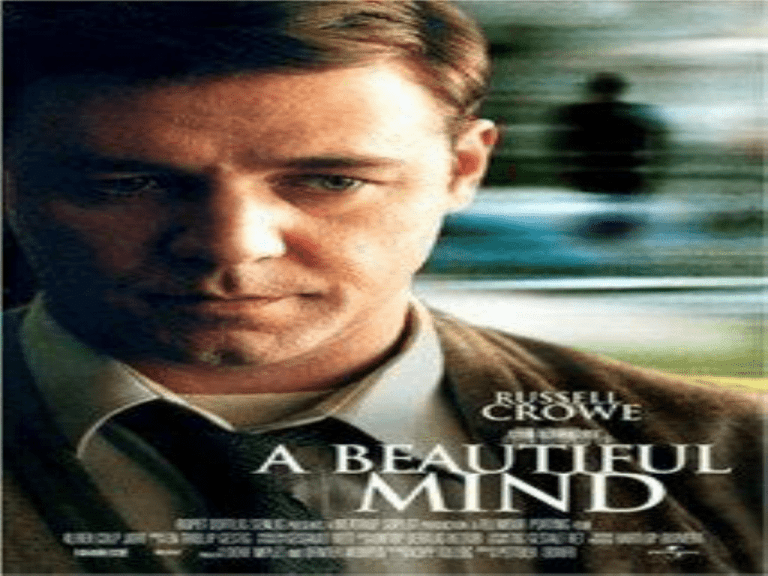
A Beautiful Mind Introduction • Genre: drama Rating: PG13, sexual themes, violence, language English: American non-standard, American standard, British standard Major Themes: Appearance vs. Reality, Disabilities, Disease mental, Espionage, Family, Man vs. Himself, Marriage Problems, Science, Search for Significance Minor Themes: Betrayal, Business/Economics, Dating, Divorce, Education. Falling in Love, Family - father problems, Historical, Man vs. Society. Outsiders, Physical Violence, Physical Violence - gun, Technology, War. Young Children Based on a True Story • Sylvia Nasar’s biography of John Nash • Hollywood often changes or omits items to illicit a particular response. • Significant aspects of Nash’s life left out – These aspects paint a negative image of the hero – These aspects do not fit with the theme of “triumph of the human spirit.” Cast Russell Crowe Ed Harris Jennifer Connelly Christopher Plummer Paul Bettany Adam Goldberg John Forbes Nash, Jr William Parcher Alicia Nash Doctor Rosen Charles Herman Sol Directors Ron Howard Director Todd Hallowell Awards • http://www.imdb.com/title/tt0268978/awards • Classes will dull your mind, destroy the potential for authentic creativity. • I've made the most important discovery of my life. It's only in the mysterious equation of love that any logical reasons can be found. I'm only here tonight because of you. You are the only reason I am... you are all my reasons Background – John Nash • Born in 1928 in West Virginia • Smart parents who valued education • Graduated from college in 3 years with a bachelor’s and master’s degree. • Considered a genius mathematician • Trying to prove original math theories Personal life • Had a son with his girlfriend – left them when his son was very young • Married Alicia in 1957 • Admitted to a mental hospital in 1959 for schizophrenia. • Had a son with Alicia who remained nameless for a year because John was in the hospital Schizophrenia • About Schizophrenia • Schizophrenia is a chronic brain disorder that affects 2.4 million Americans in a given year and more than 24 million people worldwide. Research suggests that men and women are at equal risk of developing the disease, which occurs at similar rates in all ethnic groups around the world. At this time, no one knows exactly what causes the disease or why it affects some and not others. Just like people who have arthritis or migraines, it’s not your fault that you have schizophrenia. No one is to blame. Continued… Nobody knows for sure what causes schizophrenia. Research suggests that it may be caused by an imbalance of chemicals in the brain. An imbalance in these chemicals can cause messages in the brain to get mixed up. Scientists believe that schizophrenia, like many other illnesses, results from a combination of genetic and environmental factors. • The symptoms vary from person to person. Some may have many symptoms, while you may only have a few. Generally, symptoms fall into 2 categories. They are called positive symptoms and negative symptoms. Symptoms of Schizophrenia Positive symptoms are extra feelings that usually are not present. Examples of positive symptoms include: Distortions in thought content (delusions) Hearing, seeing, tasting, feeling, or smelling things that others do not experience (hallucinations) Disorganized speech and behavior Negative symptoms • A lack of behaviors or feelings that usually are present. Examples of negative symptoms include: Losing interest in everyday activities, such as bathing, grooming, or getting dressed Feeling out of touch with other people, family, or friends Lack of feeling or emotion (apathy) Having little emotion or inappropriate feelings in certain situations Summary of Plot • Biopic of the famed mathematician John Nash and his lifelong struggles with his mental health. Nash enrolled as a graduate student at Princeton in 1948 and almost immediately stood out as an odd duck. He devoted himself to finding something unique, a mathematical theorem that would be completely original. He kept to himself for the most part and while he went out for drinks with other students, he spends a lot of time with his roommate, Charles, who eventually becomes his best friend. John is soon a professor at MIT where he meets and eventually married a graduate student, Alicia. Over time however John begins to lose his grip on reality, eventually being institutionalized diagnosed with schizophrenia. As the depths of his imaginary world are revealed, Nash withdraws from society and it's not until the 1970s that he makes his first foray back into the world of academics, gradually returning to research and teaching. In 1994, John Nash was awarded the Nobel prize in Economics. Summary • At Princeton University, John Nash struggles to make a worthwhile contribution to serve as his legacy to the world of mathematics. He finally makes a revolutionary breakthrough that will eventually earn him the Nobel Prize. After graduate school he turns to teaching, becoming romantically involved with his student Alicia. Meanwhile the government asks his help with breaking Soviet codes, which soon gets him involved in a terrifying conspiracy plot. Nash grows more and more paranoid until a discovery that turns his entire world upside down. Now it is only with Alicia's help that he will be able to recover his mental strength and regain his status as the great mathematician we know him as today. Themes • The thin line between genius and sanity • A person can overcome great difficulties if they proceed with perseverance and purpose • Even when one part of the mind is injured, the other parts can do amazing things Themes • • • • • • • • Appearance vs. Reality Disabilities Espionage Family Man vs. Himself Marriage Problems Science Search for Significance What to look for • Notice bars, graphs, patterns, grids – what is the importance of these images? • Pay attention to John’s theory – be able to explain it in your own words. • What is John’s attitude toward his students and their attitude toward him? • Notice the struggle between national concerns and family relationships. Is it okay to keep secrets from your wife/husband sometimes? Vocabulary Day 1 • • • • • • • • • • Princeton: elite university in New England Cold War: 50-year struggle between the USA and the USSR fascism: absolute control by the government cryptography: studying codes, especially for military use supplicants: people who beg or pray at a religious place seminal: a new, basic idea that can result in other ideas innovative: new way of solving a problem prodigal: someone who acts badly (the story of "The Prodigal Son") hangover: being sick in the morning after drinking too much alcohol Kreb Cycles: the chemical process for turning sunlight into energy within plants • D.H. Lawrence: early 20th-century British author • break the ice: start a conversation with a stranger Vocabulary Day 2 • • • • • • • • • • • • • a chip on the shoulder: easily made angry. integers: whole numbers (1,2,3,4,5…) a helping: one portion of food at a meal constitutional: refreshment, a bath and shave have the nerve: act daring DOD: Department of Defense hubris: great pride based on accomplishments cognitive: mental, related to thought reverie: daydreams, random thoughts bombs away: (slang) let's begin intercourse: sexual relations Einstein: famous physicist who worked at Princeton Isaac Newton: founder of modern physics Vocabulary Day 3 • sorting papers: separating papers • Adam Smith: founder of modern economics, famous for his theory of that self-interest will, in the end, result for the best common good • flies in the face of something: is proof against something • presumptions: basic thoughts that you use to build a theory • breakthrough: new idea that allows new applications • magnitude: large size • preliminary: first • data: information used in research Vocabulary Day 3 • latitude: marks on a map from east to west • longitude: marks on a map from north to south • routing: planning directions • Big Brother: an all-seeing power that judges your actions, usually in government (from George Orwell's 1984). • escort: an official companion Vocabulary Day 4 • • • • • • • • • • • • classified: official secrets (usually in the government) Pentagon: the U.S. military headquarters in Washington, D.C. H-Bomb: hydrogen bomb, a very powerful atomic weapon stress tests: tests that engineers run on mechanical devices dim: not bright, not smart MIT: Massachusetts Institute of Technology (one of the most respected technical schools in the world) Oppenheimer: chief scientist on the development of the atomic bomb incinerated: completely burned lone wolf: someone who works alone and doesn't like company security clearance: official permission to have access to secret information McCarthy: a very powerful, very anti-Communist Senator in the 1950s Miss: an unmarried woman (old-fashioned, formal, southern US) Vocabulary Day 4 • • • • • • • • polishing: making it shine, finishing something expedite: make it easier to finish a project interact: communicate with platonic: non-romantic friendship pay no mind: ignore biped: animal with two legs contrary to all probability: unexpected (very formal) there's no accounting for tastes: you can't explain what makes people like or dislike something • girlish notions: ideas or dreams that only little girls have, silly romantic ideas • verifiable data: information that can be proved by another researcher Study Questions Day 1 • • • • • • • • • • • • Describe the opening sequence when John Nash sees the others. What patterns does he see? Why is this important? What is Nash's role at Princeton? What are the prizes the students talk about? How does Nash relate to the other students? What does he think of them? What do they think of him? What does he do that is inappropriate? Describe Nash as a student. What are his problems? Why does he have these problems? What does Nash think of himself? Is his self-assessment accurate? What does Nash mean when he says, "The game is flawed"? Why does he say this? How does Nash's mind work? How does he see patterns? How do the filmmakers show this? What is meant by the statement, "In competitive behavior, someone always loses"? Do you agree? Why do all of the professors give their pens to one man? Why didn't John get a fellowship? What are his problems? What does John mean when he says, "I can't fail! This is all I have!" Do you agree with him? What will happen to him if he fails? Why do all of the professors give their pens to one man? Why didn't John get a fellowship? What are his problems? What does John mean when he says, "I can't fail! This is all I have!" Do you agree with him? What will happen to him if he fails? Study Questions Day 2 • What is John's theory? Explain it in your own words. Why is it important? • What does John get for his theory? • Describe John's relationship to the others after he gets the prize. Does he have friends now? • What is John's job? • What code does he break? Study Questions Day 3 • Describe Nash as a teacher. What is his attitude toward his students? What is there attitude toward him? Why? • How does the female student handle the problem? Explain how this relates to Nash's theory. • What does William Parcher want from Nash? • Why does Parcher think Nash will be good at this job? List as many specific reasons as you can. • How does Nash respond to Parcher? Why does he respond this way? • What is Nash's new job? • How does Nash act toward his date at the party? Why does he act this way? • Why is the woman attracted to Nash? Study Questions Day 4 • Why does Nash take packages to the drop box? What is in the packages? • Explain the conversation at the picnic. Does Alicia love Nash? Why? Does Nash love Alicia? Why? • What does Nash think of marriage? Summarize his talk with Charles. What are Nash's concerns? How does Charles respond to those concerns? Do you agree with Charles? • Who is chasing William and Nash? • How does Nash respond in the car chase? Is he a hero? Is he a coward?
